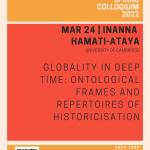Abstract
The first globalisation in human history was the globalisation of our species itself, which mostly occurred during the Pleistocene, within an interval of 90, and possibly only 50, thousand years. By around 30 thousand years ago, anatomically modern humans had colonised all of the earth’s zoogeographic realms, from the Afrotropics to the Neotropics, thus becoming the most widely diffused species of the primate order and the first cosmopolitan species of the hominin tribe. This paper presents the pattern of this first global expansion through the prism of the ‘knowledge-globality nexus’ that underscores explanations of subsequent globalisation movements observed in human ‘history’. Drawing on natural and historical biogeography, evolutionary biology, and the palaeoanthropology of knowledge and technology, I propose a ‘cultural biogeographical’ approach to identify one central logic of Palaeolithic globalisation, namely, behavioural thermoregulation as a non-biological adaptive response to the environmental challenges humans encountered as they expanded from their Afrotropical homeland into the world.
Speaker Bio
Dr Inanna Hamati-Ataya is Principal Research Associate and Principal Investigator on the ERC-funded projects ARTEFACT (2017-2023) and NOAH (2022-2023), and founding director of the Centre for Global Knowledge Studies (gloknos). Dr Hamati-Ataya’s research lies at the intersection(s) of global politics, deep history, social theory, natural and historical epistemology, and the anthropology, history, and sociology of knowledge, science, and technology. Her on-going project ARTEFACT (The Global as Artefact) aims to develop a novel understanding and theorisation of ‘the global’ by examining the constitution and transformation of global political structures from the anthropological perspective of humankind’s epistemic development. Taking as a case-study the emergence and diffusion of four major global agricultural revolutions from the Neolithic to the contemporary era, the project examines the patterns and pathways of socio-epistemic co-constitution and co-evolution that underscore the formation and transformation of increasingly inclusive world systems since human ‘pre-history’. With her forthcoming project NOAH (A New Noah’s Ark), Dr Hamati-Ataya is taking some insights from ARTEFACT to proof of concept. Focusing on the effects of climate change on agricultural production across Europe, NOAH will develop a novel model of technology transfer to secure the preservation of ancestral agricultural knowledges across regions variously affected by anthropogenic climate change.




